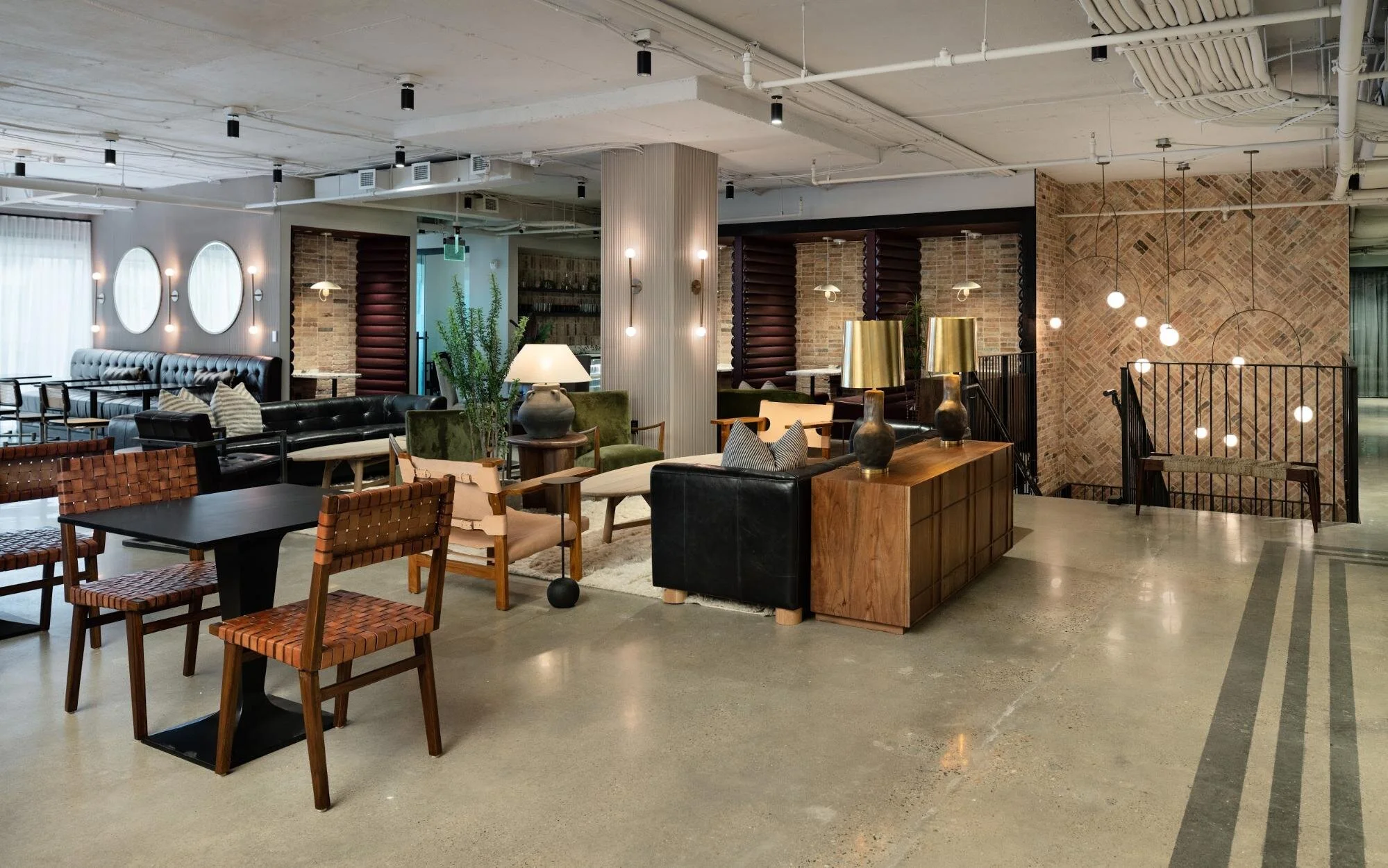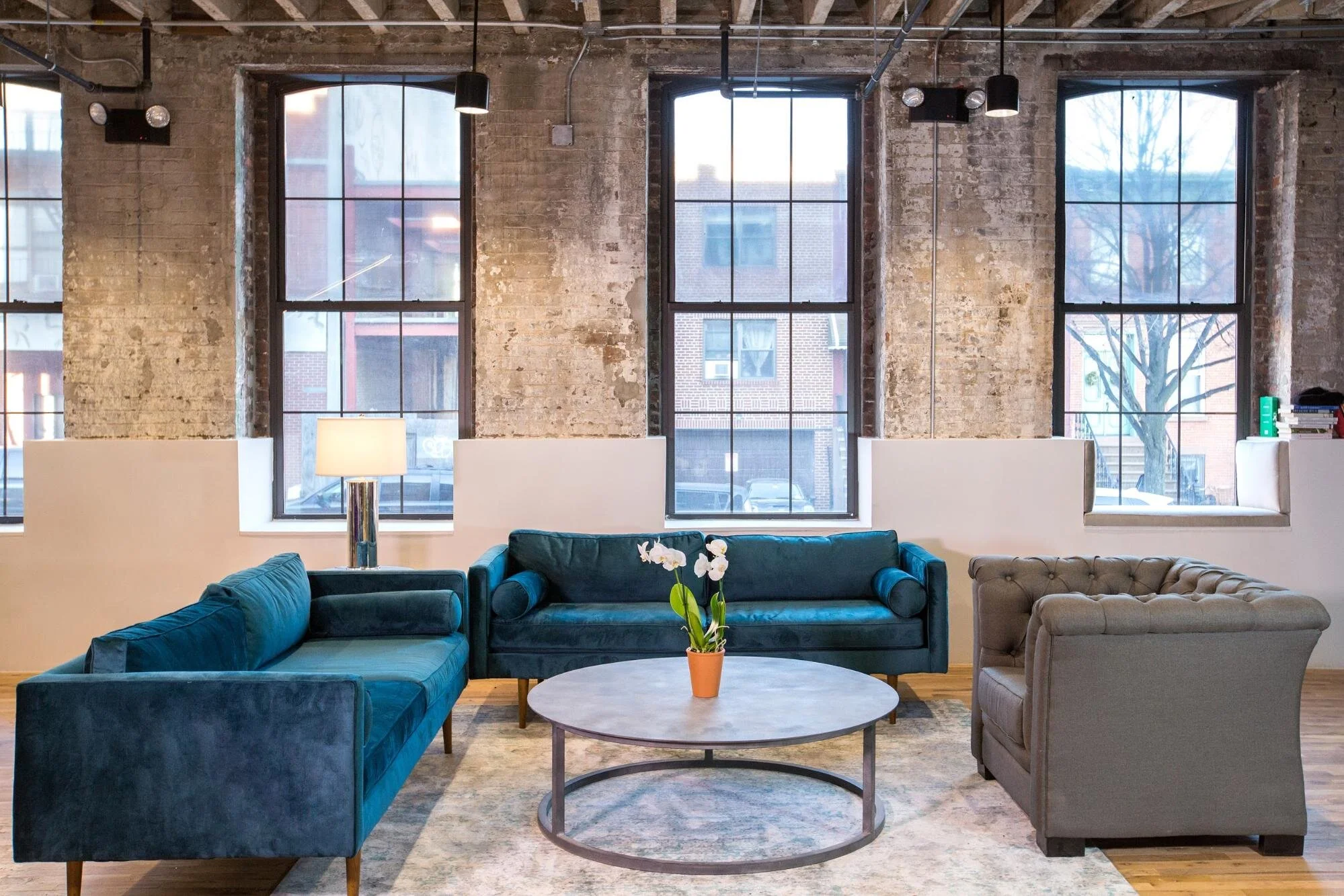By Bond Collective Staff
Businesses of all types and sizes are discovering the benefits of the shared workspace.
Whether it’s to accommodate a few new employees, an entire team, or the whole operation, this novel work option can save your company the expense, time, and stress of purchasing and maintaining its own space.
In this article, the experts at Bond Collective tell you everything you need to know about shared workspace so you can make the right choice for your business.
What Is Shared Workspace?
A shared workspace is an office or other environment in which self-employed individuals or individuals employed by different businesses share equipment, ideas, and knowledge for the betterment of all involved.
Additionally, the concept of shared workspace extends beyond the physical — space where diverse individuals gather — into the realm of a community based on mutual trust, common values, and the synergy that comes from working alongside other like-minded professionals.
Shared workspace goes by several different names, including:
Some even refer to it as a virtual office because it’s an easy way to establish a mailing address without the expense of leasing and staffing your own office.
How Does Shared Workspace Differ From Office Sharing?
Another common name you might hear in connection with shared workspace is office sharing. On the surface, these two terms may seem synonymous, but they’re actually very different concepts.
Office sharing is an arrangement wherein a company that owns or manages a large space rents redundant offices to a smaller company.
So, for example, imagine that Intel leases a large office space but, for whatever reason, only uses three-fourths of that space. Intel might sublease the other one-fourth to an architectural firm or an advertising agency or a consulting group.
Thus, they share an office with another business.
Intel receives income on an unused asset, while the other business gains access to a professional office environment they might not otherwise be able to afford.
This lies in contrast to a shared workspace managed by a third-party company (such as Bond Collective) in which Intel, the architectural firm, the advertising agency, the consulting group, and others rent offices or desks and work together in the same space.
Thus, they all operate in a shared workspace with many other businesses.
Who Uses Shared Workspace?
1) Freelancers And Digital Nomads
Working on the couch or at the kitchen table, in a hostel room, or in a busy cafe can be isolating, uninspiring, distracting, and difficult.
That’s why many freelancers and digital nomads use a shared workspace as their office. There, they can work, network, socialize, brainstorm with others, and enjoy the perks of an office environment without the expense of building and maintaining their own.
2) Entrepreneurs
There are many different types of entrepreneurs — including prodigy, rebel, hustler, and innovator — but all can benefit from basing their business in a shared workspace.
First and foremost, doing so can help save hard-earned capital for more important expenses (such as perfecting your product or service).
Renting an expensive, standalone office space or restricting yourself with a long-term lease, is a serious drain on your bank account. By conducting business from a shared workspace, you pay a fraction of what it would cost to maintain your own office.
3) Lifestyle Entrepreneurs
A lifestyle entrepreneur is a person who creates a business with the purpose of altering their personal lifestyle. The choice is not solely about making more money or creating a groundbreaking product.
In fact, many lifestyle entrepreneurs make less money for the first few years than they did working in a “conventional” job.
A lifestyle entrepreneur focuses more on the life rewards (rather than the monetary rewards) provided to those that have a true passion for their work and enjoy what they’re doing.
In contrast to the common 9-to-5 career where a person works from the same location every day, a lifestyle entrepreneur usually works online and can operate from anywhere they choose.
All they need is a computer (usually a laptop) and an internet connection to keep things running. That makes a shared workspace the perfect place for a lifestyle entrepreneur to set up shop and get work done.
4) Solopreneurs
A true solopreneur is a professional who starts and develops a business that is portable, scalable, and produces passive income — all without the help of other employees.
That doesn’t mean that solopreneurs have to do it all themselves. They might hire freelancers or contractors, but they still hold full responsibility for running their business.
Shared workspace is perfect for solopreneurs because it provides a place to coordinate their day-to-day activities (and the activities of any freelancers they may hire) that is both inspiring and free from the distractions of working from home.
5) Consultants
Consultants give expert advice to other people working in a specific field and help them reach their goals. As such, they conduct most of their business online, over the phone, or by visiting businesses in person.
Working from a shared workspace is an ideal way to build a consulting business from the ground up because it provides a professional atmosphere where you can take calls, meet online, and even host clients without the expense of maintaining a space of your own.
These types of coworking environments also make it easy for you to leave at a moment’s notice for a face-to-face meeting because you don’t have to worry about what’s going on back at the office while you’re away.
6) Local Teams
Many established businesses are discovering the benefits of the shared workspace for their local teams.
Workspace is at a premium these days, and it may be hard to find an adequate place for a new team to work together in an existing office.
Instead of packing team members in like sardines or making them work from the break room, assign them to a shared workspace several days a week where they’ll have room to move and collaborate to their heart’s content.
They can always report to your main office — or even telecommute — for team meetings and to stay in touch with the business as a whole.
7) Remote Teams
Remote teams are becoming more and more common these days, and a shared workspace is the perfect way to provide a professional place to work.
Your business’s main office may be located in one city (e.g., New York City), while a number of employees make up a remote team in a different city (e.g., Boston).
This remote team may not be a completely new and autonomous satellite office (discussed below), but they still need to come together in a dedicated space to get their work done.
How can a business make that work? With a shared workspace.
The remote team can report to work every day and stay in touch with the main office through video conferencing and similar technology.
8) Distributed Teams
Members of distributed teams are also making use of the shared workspace movement to great effect.
Business owners that run their operation from a central location and employ team members or freelancers from other locations can help this type of team stay productive by providing access to a shared workspace near each employee.
The employees then have a place to work that is free from the hustle and bustle of the corner coffee shop, flexible, and much less expensive for the business than purchasing an office of their own.
9) Work-From-Home Employees
Whether you find yourself working from home these days or managing a team that does, one of the key factors to continued success is maintaining focus in a novel environment.
Productivity is a key concern for businesses with employees that work from their kitchen table or living room sofa every day.
For some work-from-home employees, learning to maintain efficiency is as easy as 1-2-3. For others, though, it’s a struggle they feel they’ll never win.
As a manager or owner, you can give your team members the best chance for success by giving them access to a shared workspace nearby.
The employees can then “get out of the house” and into a space that is better suited to the activities your business and your team needs to stay on track.
10) Work-From-Anywhere Employees
Businesses of all sizes and types are realizing that employees can maintain their productivity, creativity, and collaboration even when they work from anywhere.
No longer do team members have to report to a physical office every day. They can literally live anywhere and telecommute in order to work together, access resources, and communicate with management.
And while some few work-from-anywhere employees may choose to conduct business from a home office, the vast majority prefer to do their work from a shared workspace every day.
Reporting to a coworking space, instead of to their kitchen table, gives them a sense of purpose and focus that can’t be found anywhere else.
11) Startups
Ask any startup, “Why do you love shared workspace?” and they’ll be happy to sing its praises and tell you how it helped them grow their business.
That’s because coworking spaces keep overhead costs low at a time when that money is desperately needed for research, development, and marketing.
12) Small Businesses
Small businesses often use shared workspace because of its centralized location with easy access to transportation, dining, shopping, and other amenities. And certain coworking spaces — like those at Bond Collective — are the epitome of luxury, class, and professionalism.
Most small businesses wouldn’t be able to afford on their own what they can get for a low monthly fee in a shared work environment.
13) Satellite Offices
A satellite office is an additional location (a branch) of a larger company that is physically separate from the business’s main (or first) office.
Companies large and small are choosing to establish satellite offices in shared workspaces in different areas, different cities, different regions, or different countries.
Why would they do this, and why should you consider it as well? Because of the many benefits working from these types of offices can bring.
We’ll discuss a number of them in detail later on in the article, but here are just a few ways your business can benefit from setting up a satellite office in a shared workspace:
-
Access to a new talent pool
-
Easier recruitment
-
Efficient customer service
-
Local brand recognition
-
Stronger connection to customer base around the satellite office
-
Improved company perception
-
Entry into new markets
-
Streamlined networking
-
Reduced commute time
-
Better business and team collaboration
14) Small, Medium, And Large Enterprises
Enterprises and corporations of all sizes are using shared workspace to their advantage.
While many of these businesses have their own dedicated buildings, they use the luxury and modern conveniences of coworking spaces to entertain clients, expand their teams, establish offices in new locations, and help their employees stay motivated.
Does Your Business Need A Shared Workspace?
Does your business need a shared workspace? Without knowing your unique situation, we can’t answer that precisely, but we can say, “Probably.”
Companies large and small can benefit from basing individuals, teams, divisions, and even the entire operation in a shared workspace. Even if your business already has a place to work or leases its own office, there are many ways to use a shared workspace to your advantage.
Here are just a few scenarios:
-
Outgrowing your current office
-
Setting up a satellite team
-
Meeting with investors
-
Hiring seasonal or project-based employees
-
Working while traveling by utilizing a day pass
-
Expanding your business to a new state, coast, or country
-
Entertaining clients
-
Renting conference space
-
Utilizing temporary office space during construction or renovation
-
Housing your business while moving
-
Hosting an event
With a shared workspace, you don’t have to worry about lost progress and revenue when one of these situations — or any number of others — affects the way you work.
Your team and your business can keep doing what they do best: providing the best product or service to its customers. All without the interruptions that cause productivity to fall.
Benefits Of Shared Workspace
1) Crisis Management
In a conventional lease arrangement, crisis management falls directly on your shoulders. For example, if the internet goes down or a pipe in the bathroom breaks, you have to divert your attention from your business to restoring a conducive work environment.
That can mean lost time, lost energy, and lost revenue.
But when you base your business in a shared workspace, infrastructure emergencies won’t distract your team from the task at hand.
2) Inspiring Design
The best shared workspaces — such as those at Bond Collective — are built and decorated with inspiring design in mind.
That translates to inspiration for your team, a professional image for your business, and a “Wow!” factor for customers and clients who might visit you there.
3) Amenities
When you base your business in a Bond Collective shared workspace, you instantly gain access to tons of amenities that are available whenever you need them.
Whether it’s printing at 2 a.m., prepping for a large conference the next day, or lining up refreshments for your next board meeting, Bond Collective always has your back and is ready to help.
We even offer amenities the others don’t, such as amenitized showers with towel service, mothers’ rooms, and a streamlined billing and booking portal for your convenience.
4) Collaboration
Collaboration is about working together in a mutually beneficial relationship to provide the products, services, or guidance each party needs to get ahead.
In a shared workspace, your team works side-by-side with professionals from a wide variety of business types. This close proximity allows you to collaborate with CEOs, writers, marketing reps, graphic designers, editors, digital artists, photographers, and specialists of all sorts.
5) Infrastructure
Taking care of infrastructure such as electricity, water, gas, internet, tech support, and daily supplies that your team depends on can occupy a good portion of your workday.
Even if you’re focused on a project, there are always minor jobs (e.g., refilling the toner and paper in the printer) that must be done before you can make any progress.
But in a shared workspace such as Bond Collective, infrastructure is taken care of for you. You can cross those items off your to-do list and dedicate your energy to making progress in your business.
6) Location Flexibility
The cornerstone of modern work environments is the ability to work remotely, especially when work paradigms and practices shift dramatically overnight.
Basing your business in a shared workspace that has multiple locations in the city where you work — or even across the country — means that your team has access to location flexibility like never before.
7) Freedom To Expand Or Contract At Will
One of the many unique and beneficial aspects of a shared workspace is its flexibility — not just across multiple locations, but within a single location as well.
With a shared workspace, you can expand or contract your physical footprint to fit your business needs at a moment’s notice. For example, your team can work from reserved desks in April, move into a private suite in May, and back to hot desks in June.
Doing so can help you save money and adapt to fluctuations in productivity, revenue, and the market at large that are inevitable in the business world.
8) Decreased Overhead
Benefits aren’t always measured by how much work you get done in a single day. Sometimes, your business benefits from how much money it can save in the process of getting things done.
Shared workspaces reduce the cost of overhead to almost nothing. That allows you to focus your time, energy, and hard-earned capital on the more important aspects of building your business for the future.
Shared Workspace At Bond Collective
Whether you need a private office, a suite of offices, or just a place to set your laptop, you’ll find the best shared workspace at Bond Collective.
It doesn’t matter if you’re a solopreneur nurturing a startup into existence or you need space for a team of 50 or more, at Bond Collective, everyone enjoys the same expertly designed interiors and industry-leading amenities, including:
-
Guest reception and greeting
-
Conference rooms for 2 or 20+
-
24-hour access
-
Private meeting and phone booths
-
Custom build-outs
-
Nightly office cleaning
-
On-site kitchens
-
Porter service
-
Unlimited black-and-white printing
-
Fast, reliable WiFi and internet
-
Mail and package handling
-
Fresh fruit, snacks, and weekly breakfast
-
Complimentary spa water, craft beer, and coffee
All of this (and so much more) makes Bond Collective a true turn-key solution to all your business needs.
Visit any one of Bond Collective’s many locations in the United States, including shared workspace in California, New York, Pennsylvania, Washington D.C., Illinois, Tennessee, and Texas.
Or call us today to find out more about everything we have to offer. And while you’re at it, schedule a tour to experience first-hand how the boutique shared workspaces at Bond Collective can benefit your business.







